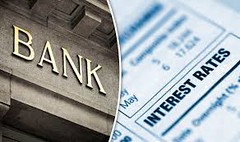Interest rates hard to fall due to high inflation
If inflation is low interest rate will be gone down respectively, but if inflation is forecasted to rise, interest rate will tend to rise respectively.

General Statistical Office of Vietnam (GSO) has released March consumer price index (CPI) which rose 0.57 percent from February and 1.69 percent compared to the same period in 2015, the first three months CPI rose 0.99 percent totally.
Economic experts said that inflation in the market economy was the basis for the central bank to control monetary policy and to set interest rate accordingly.
If inflation is low interest rate will be gone down respectively, but if inflation is forecasted to rise, interest rate will tend to rise respectively and it is the result of the relationship between fact interest rate and nominal interest rate so the rate of inflation requires nominal interest rate to increase proportionally if real interest rate remained unchanged.
“On the other hand, when people anticipate about risen inflation such as the expected inflation in 2016 is expected to increase 3-5 percent, they will spend their savings on goods or financial products such as gold, foreign currency or real estate so the supply of funds for lending and rising interest rates put pressure on the market. Besides, while government bond yields are still high, deposit rates and lending rates could not be lowered, and it is hard to reduce interest rate” according to economist – Dr Nguyen Tri Hieu.
The State Bank of Vietnam (SBV) Hanoi Branch has released a Quarter I/ 2016 report on banking operations in Hanoi, which the VND deposit interest rate was still at low level but credit institutions in Hanoi had used more aggressive measures to boost capital mobilisation, promoted new deposit products for customer so VND deposit still was in an upward trend.
For example, on March 21st, Vietcombank’s long term interest rate has significantly increased 6.5 percent/a year in the term of 24-60 months, which stood still at 6.2 percent/ a year. At BIDV, the highest interest rate of 6.8 percent/a year has previously been raised by 7.2 percent/a year in the term of 36 months; 6.8 percent/a year in the term of maturity of 364 days and 12 months and 5.5 percent/a year in the term of 3 months, similarly at VietinBank in the term of 3 months and in the term of 36 months.
Meanwhile, Hanoi’ financial operation report also made a significant information, which the total mobilised capital of credit institutions in the province reached 1,482,180 billion in 03/31/2016, an increase of 0.5 percent from 12/31/2105 and 21.86 percent from the same period in 2015. However the total outstanding loans of credit institutions in the province was higher than the total of mobilised credits, specifically, total outstanding loans was 1,251,903 billion, an increase of 1.15 percent compared to 12/31/2015 and 21.68 percent compared to the same period in 2015 (0.2 percent in January, 0.7 percent in February).
According to Dr Le Xuan Nghia – economic expert, the real liquidity was always the problem of banking system in Vietnam, especially after the government allowed to issue the short-term bond and big banks were not too difficult, small banks were very difficult, vice versa which is reflected in the recent Lunar New Year.
Besides, the government bonds has been in an upward trend, CDS index (measuring the risk of government bonds) also increased significantly, especially government bond’s buyer has not assured of the growing budget deficit. Currently, many businesses are expected to have bank loans to expand investment but if interest rates has still increased by 1-2 percent, the enterprise will “run away”. This is the big problem of monetary policy at this time.
Pham Hong Hai, general director of the Bank Ltd HSBC (Vietnam) said that the interest rates were unlikely to fall in the near future and with increased economic demand so MOF should mobilise more capital to invest in infrastructure development. Besides, USD interest rate increases, the VND interest rate should be raised attractive enough to encourage people to keep and save in dong.
“Banks may resolve some major and important issues, but in a deep look visible strength of the system is still very weak with many weak banks. Bad debt of the whole system is so much and that is the reason why the deposit and lending rates story is a forever low treatment, even when inflation decrease lower” according to Dr Tran Dinh Thien, director of the Institute of Economics Vietnam.
Source: intellasia.net
